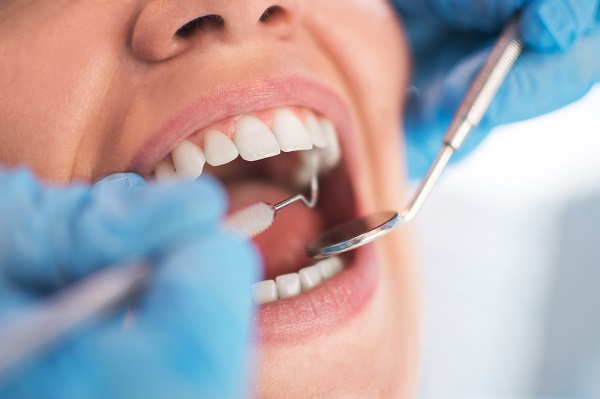



Thinking about getting an oral cancer sceening? Oral cancer screenings are a very important part of general dental care as they ensure the health of patient's oral cavity. They involve a few steps that are typically painless. Understanding the process of an oral cancer screening can be helpful for patients who are not sure what to expect. Keep reading to learn more.
What goes on during an oral cancer screening?
Below is an outline of what to expect during an oral cancer screening.
The oral cancer screening process
An oral cancer screening will include three main parts:
- Physical examination of the oral cavity: The dentist will use a gloved hand to feel around the patient's mouth. The soft tissues and gumlines will be felt to check for lumps or bumps that may indicate a warning sign. The dentist will carefully perform this part to ensure there is nothing abnormal
- Visual examination of the oral cavity: The visual part of the oral cancer screening is similar to a check-up visit, however, it wil be much more detailed. The dentist will carefully inspect each tissue in the mouth, looking for any spots or patches that indicate oral cancer. Usually, the spots are red or white, however, some may be darker in color, such as brown or black
- Additional tests: Some oral cancer screenings include additional tests that rely on the use of dye or a laser. If the visual and physical part of the examination indicates anything slightly abnormal, the dentist may apply a dye to check for oral cancer. Additionally, a laser may be used to perform a biopsy, which tests for oral cancer cells
The steps listed above may vary per patient; however, for the most part, these are the general guidelines of an oral cancer screening.
Other things to know
It is important to know that some people are more prone to oral cancer than others, which may necessitate more frequent screenings. For example, individuals that smoke tobacco or consume a lot of alcohol are especially at risk. Additionally, those that have family genes of cancer may pose a higher risk. Individuals that are at higher risk should talk with the dentist to determine what preventive measures can be taken. The dentist may suggest frequent oral cancer screenings, extra oral hygiene, and avoiding super sun exposure.
Oral cancer is often treated with surgeries, medication, and sometimes chemotherapy, all of which are necessary in order to prevent the cancer from spreading to other parts of the body where it could get worse.
Ready to schedule an oral cancer screening?
Individuals that want more information on oral cancer screenings and what they entail can consult directly with a general dentist to learn more. The dentist can provide detailed information on the importance of screenings. Additionally, the dentist can answer questions and go over concerns about the process. Reach out today to find out more or to get scheduled for an appointment.
Request an appointment here: http://www.drmccawley.com or call James R McCawley DDS at (615) 526-2497 for an appointment in our Murfreesboro office.
Check out what others are saying about our dental services on Yelp: Oral Cancer Screening in Murfreesboro, TN.
Recent Posts
Patients often wonder what occurs during an oral cancer screening. Read on to learn more about this essential part of a dental checkup. Dentists are trained to provide visual oral cancer screenings. Depending on someone’s lifestyle choices or family history, the dentist may suggest an oral cancer screening. These visual exams take just a few…
Wondering what the signs of oral cancer are? General dentists are specifically trained in performing oral cancer screenings and thus know exactly what to look for. Dental patients can also check for signs in between screenings.Learning how general dentists perform oral cancer screenings will help dental patients know what to expect when undergoing this important…
Gum disease is not a condition you should ever ignore. At the first signs of trouble, you should talk to your dentist about how to treat these issues and restore your gums to good health. While the dentist can recommend in-office treatment, there are also things you can do on your own. Along with good…
Want to understand what gum disease can do to one’s mouth? Once someone is diagnosed with this oral disease, there are many ways it can cause them to experience bad overall dental health. Patients who are diagnosed can ask their general dentist any specific questions they have about preventing and treating gum disease, as prevention…


